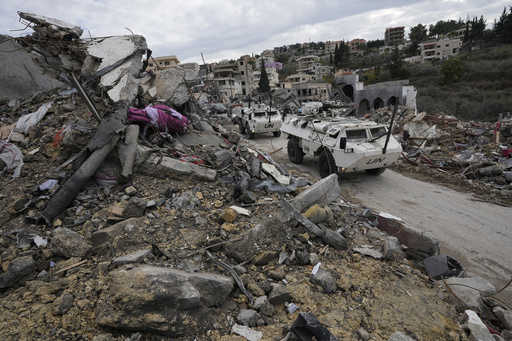
BEIRUT — Just hours after a ceasefire mediated by the United States was established to resolve the conflict between Israel and Hezbollah, Lebanese citizens awoke to celebratory gunfire rather than the sounds of airstrikes and surveillance drones. This moment marked a rare period of calm in Lebanon, where the upheaval of war had continued for an entire year. Many individuals who had been displaced returned joyfully to their hometowns in southern and eastern Lebanon.
However, the joy of returning was quickly overshadowed by the stark realization of the extensive destruction that had occurred. Numerous towns and villages across southern and eastern Lebanon, as well as areas in Beirut, have been left in ruins, with entire communities erased and thousands of structures damaged. The World Bank has estimated the overall damage to be around $8.5 billion. In the context of a nation that has long grappled with a multitude of crises, the ceasefire has unveiled more uncertainties than resolutions.
Significant concerns linger about the rebuilding process. Who will finance the reconstruction? Will Hezbollah comply with removal of its fighters and weaponry from the south, relocating north of the Litani River? Additionally, how will the Lebanese army ensure that this compliance occurs? There are also questions about whether Israel will accept the presence of weakened militants in its vicinity.
Political stagnation in Lebanon, exacerbated by the war and the divisions between pro-Hezbollah and opposing factions, has raised concerns about potential instability that could jeopardize the ceasefire. Some factions express anger towards Hezbollah for what they perceive as a provocation that led to this devastating conflict with Israel.
The peace agreement outlines a 60-day initial phase requiring both Hezbollah and Israeli forces to withdraw from southern Lebanon while the Lebanese army steps in to secure the area. It is tasked with dismantling Hezbollah’s military structures and ensuring that they are not rebuilt—a task fraught with tension that could lead to conflict between the army and the well-armed militant group.
The Lebanese military, largely supported by the U.S. and other western nations, represents a rare unifying force amidst the country’s fractious political landscape. Nevertheless, it has historically avoided confrontation with Hezbollah, which maintains strong backing from Lebanon’s Shia community. Hezbollah lawmaker Hassan Fadlallah assured that the group would work alongside the army to implement the ceasefire but claimed that the military lacks the capacity to defend Lebanon against Israeli aggression, stating that Hezbollah would continue to fulfill that role when necessary.
Critics argue that expecting the army to disarm Hezbollah is unrealistic. “To suggest that it can disarm or dismantle Hezbollah’s infrastructure is, frankly, absurd,” stated Lebanese commentator Mike Azar. A military official shared that the army’s deployment in southern regions will occur gradually as Israeli forces withdraw, but he spoke on the condition of anonymity due to a lack of authorization for media comments. Meanwhile, the U.S. and France are set to assist in monitoring the implementation of the ceasefire resolution.
The credibility of this ceasefire is under scrutiny, particularly regarding the commitment from all involved parties. Salman Shaikh, formerly a political advisor during the 2006 war, highlighted the importance of cooperative adherence to the agreement. Detractors of the solution caution that Lebanon may bear the heaviest burden, while Israel retains the liberty to act against Hezbollah if compliance falters.
Lebanon has been in a dire financial crisis since 2019, which has plunged millions into poverty and significantly crippled its banking sector. This precarious economic position has also impacted the military, leading to low morale as many servicemen leave or take on second jobs for financial survival. The agreement envisions boosting military presence in the south, with plans to recruit an additional 10,000 troops, yet achieving this without substantial funding seems unfeasible, especially considering the immense costs of rebuilding.
Recently, a donor conference in Paris resulted in an international pledge of $1 billion, earmarking $800 million for humanitarian aid and $200 million for military support. However, many aid organizations report that these funds have yet to materialize. Mercy Corps noted that Lebanon’s GDP experienced a contraction of 6.4% during the last two months of the conflict alone, emphasizing the urgent need for housing and assistance for those displaced as winter approaches.
Amid these challenges, the question of financial responsibility looms large. Although Iran has expressed willingness to assist, it is grappling with its own financial limits due to sanctions. Oil-rich Gulf states, which helped with reconstruction post-2006, appear reluctant to support a political class that they distrust.
Even prior to the war, Hezbollah and its military capabilities had ignited considerable controversy within Lebanon, with supporters emphasizing its role in national defense while critics viewed its arsenal as a violation of national sovereignty. This has led to longstanding calls for disarmament. Senior parliament member Alain Aoun has highlighted the urgency of electing a president to break the two-year political stalemate, find reconstruction resources, and address pressing economic issues.
Many are frustrated by Hezbollah’s unilateral actions, particularly its attacks on northern Israel, which were framed as solidarity with Hamas. This has drawn ire, with critics arguing such actions have embroiled Lebanon in conflict and provoked brutal retaliatory strikes from Israel. Even within Hezbollah’s circle of allies, there appears to be growing discontent about its approach.
Amidst this turbulence, calls for a presidential vote signal a potential shift in Lebanon’s political landscape, which might challenge Hezbollah’s dominance. Shaikh argues that international support will play a pivotal role in helping Lebanon address its multifaceted dilemmas extending beyond just the conflict with Israel.
